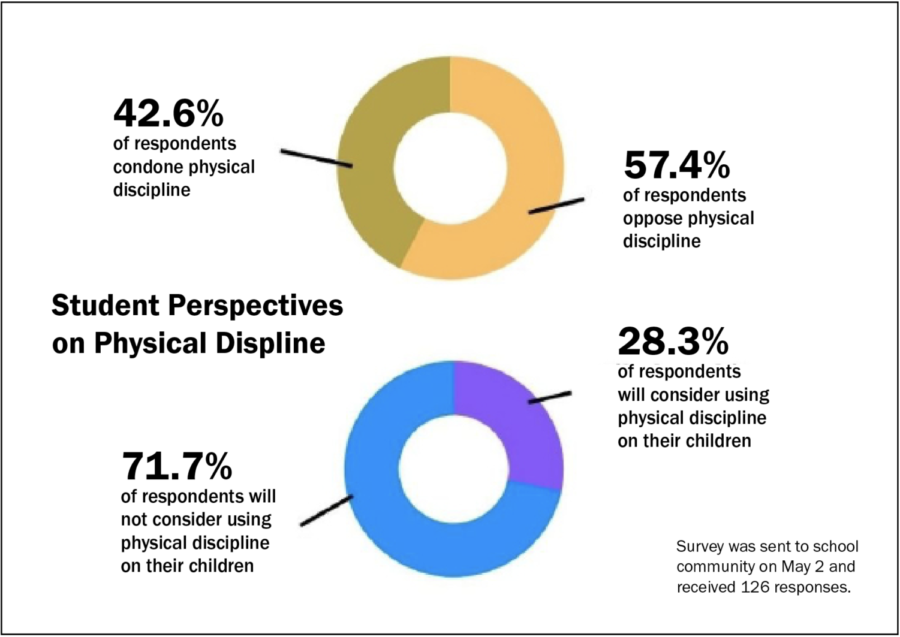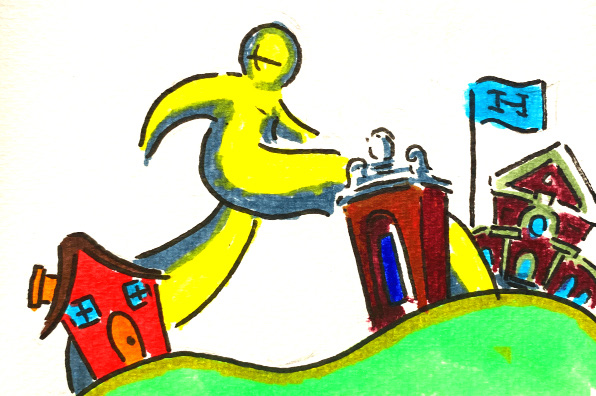We Need To Talk About Physical Discipline
“Is it OK to physically punish children for the purpose of discipline?” People have various answers to this question. According to a survey of 116 Hotchkiss students, while 57.4% of students are opposed to physical punishment, the other 42.6% view it as acceptable. 28.3% of respondents answered that they would consider using physical discipline on their children in the future. We must talk more about the issue of physical discipline and bring that percentage down to zero.
Physical discipline poses a myriad of physical and psychological risks to children and does not facilitate education. It does not foster a healthy parent-child relationship.
Physical punishment is a common occurrence in many households. In the survey, 56.6% of students admitted to receiving physical punishment from their parents. There are many reasons for this. Some parents think that, in the absence of physical discipline, children will become spoiled and undisciplined. Some parents also get agitated when verbal discipline can’t seem to make children comply and, thus, resort to physical discipline.
Spanking and other forms of physical discipline can severely harm children. Spanking children does not teach them responsibility, conscience development, and self-control. Spanking children implants fear, rather than a sense of right or wrong. Is learning to “behave” in front of others the goal of education? No, it is not.
In addition, children learn from watching their parents. Parents who use physical discipline may be teaching their children to resolve conflicts with violence. According to the American Psychological Association, spanking can elevate a child’s aggression levels as well as diminish the quality of the parent-child relationship. Not only that, physical discipline can lead to depression and fear, undermining a child’s ability to form meaningful relationships with others.
Moreover, the constant stress of physical discipline can negatively affect brain development. According to the Child Development and Family Center of Northern Illinois University, children who were educated by using other forms of guidance or discipline showed an IQ score of five points higher than children who were spanked.
Most importantly, studies have documented that physical discipline can escalate into abuse. Elizabeth Gershoff, Ph.D., a leading researcher on physical punishment at the University of Texas at Austin said, “Physical punishment doesn’t work to get kids to comply, so parents think they have to keep escalating it. That is why it is so dangerous.” Physical discipline poses a serious threat to children because it could easily spiral into serious physical and psychological harm. With these harmful effects in mind, the high percentage of students who responded that they would physically discipline their children is incredibly concerning.
Spanking is only a temporary solution to an ongoing problem. There are far better solutions when disciplining children. First, teach children what to expect. Instead of aggressively punishing them for misbehaving, teach them what they can do differently. Second, recognize their positive behaviors. Too often, parents only notice their children’s misbehaviors and disregard the things they do well. Third, state your request in the positive. Have you ever noticed how we usually make a request or give directives in the negative? Just by changing the structure of how you make requests, you can increase your child’s cooperation. They are less likely to argue when you are telling them what they can have or what you will allow. Finally, take a timeout. Yes, you, the parent, should walk away. This method of discipline fosters reflection and self-awareness because it gives children the space to think through their actions.
Although many studies show that more and more American parents are starting to disapprove of corporal punishments, this issue certainly remains prominent in this country. So please, parents, if you ever feel frustrated and find yourself wanting to resort to physical discipline, remember that your actions could have serious consequences for your child.




